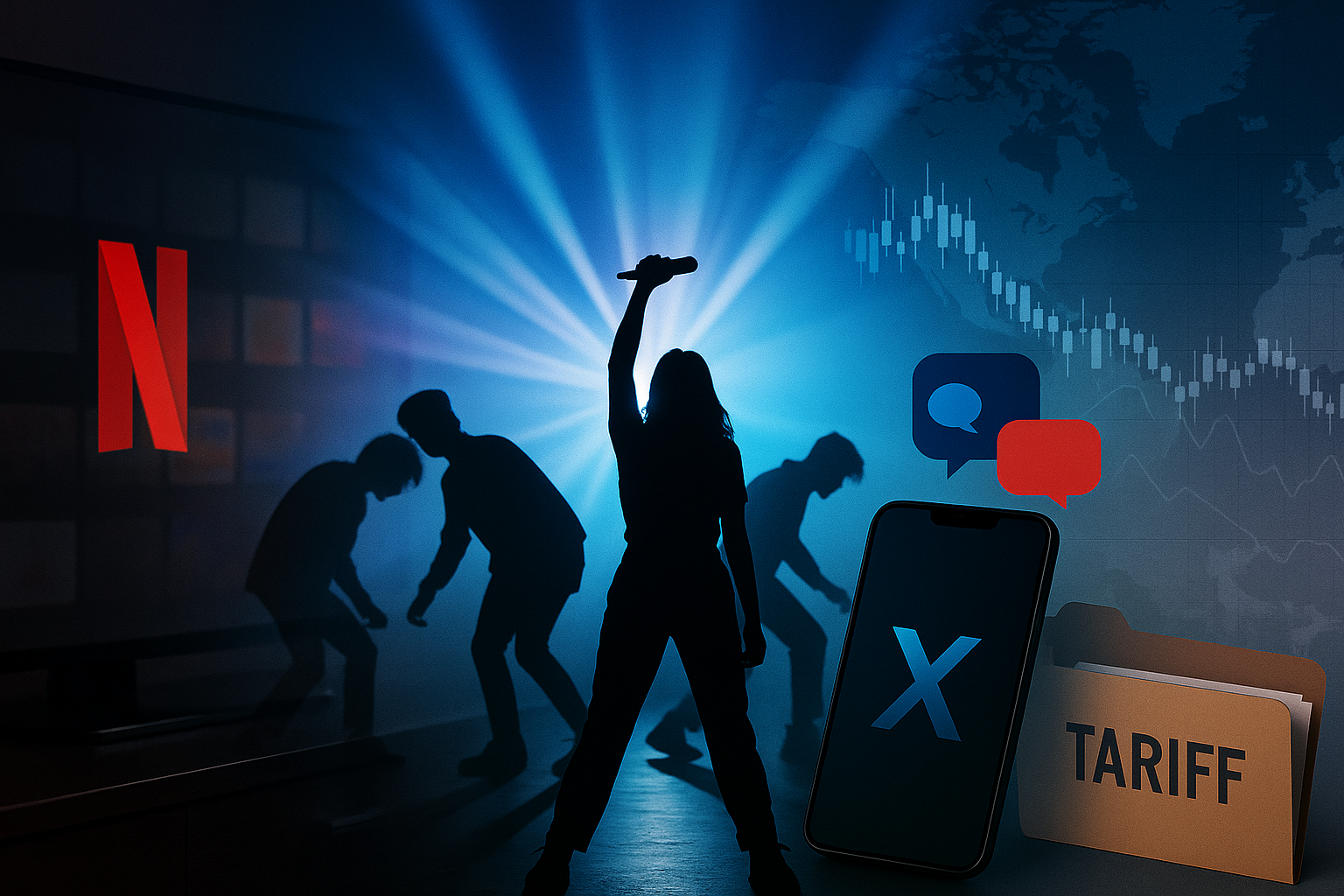Netflix’s “K-Pop Rally” Stalls: Musk Boycott & Tariff Threats Cloud Upside
By Tredu.com • 10/9/2025
Tredu

From Rally to Resistance: What’s Unraveling at Netflix
Netflix soared earlier in 2025, propelled in part by the global success of its first K-Pop animated feature, “KPop Demon Hunters”. That momentum, however, has begun to show strain as external pressures mount.
The NYT-style narrative: Netflix expected a “KPop rally”, but Elon Musk’s boycott campaign and tariff uncertainty have injected volatility back into the name.
Musk’s social media calls for cancellation, combined with threats of new streaming-related tariffs by U.S. trade policymakers, have investors wondering whether the rally had legs to begin with.
Fuel for the Rally: K-Pop Hit, Subscriber Surge & Global Reach
“KPop Demon Hunters” broke records, becoming Netflix’s most-watched original movie in many markets. That success fueled hopes for a broader push into culturally resonant IP, especially in Asia and Latin America, a growth lever Netflix has long tried to develop.
The strategy: use “superfan economy” content to deepen engagement, boost downstream viewership, and enable stronger monetization via regional pricing, merchandising, and spin-offs.
The stock responded: it was among the top performers on the Nasdaq 100 in H1 2025, surging ~50%, partly on the back of that content momentum.
What’s Pressuring the Momentum
Musk’s “Cancel Netflix” Campaign
Elon Musk has publicly urged his followers to unsubscribe, calling Netflix “cringe.” That kind of influencer pressure can create social media backlash, hurt brand perception, and introduce reputational risk, particularly in core U.S. and youth demographics.
Given Musk’s reach and the narrative culture wars he often courts, even modest cancellations or negative publicity can knock sentiment around.
Tariff & Regulatory Uncertainty
Washington is reportedly weighing new tariff proposals targeting digital services or streaming imports. If implemented, these could undercut international revenue growth, escalate content costs, or invite retaliation from foreign governments.
Streaming platforms may be viewed through the same lens as other content distributers subject to trade policy, meaning Netflix’s international monetization strategy could face headwinds.
Valuation Crowding & Sentiment Risks
Much of Netflix’s rally has already been priced in. When external shocks arise, like Musk’s cancel calls or tariff speculation, valuation multiples can unwind quickly.
Moreover, markets are sensitive now to narratives more than fundamentals. A negative sentiment turn, even if temporary, may invite overreactions.
Market Implications & Strategic Responses
Streaming & Media Sector Exposure
Competitors, Disney+, Amazon Prime Video, Warner Bros Discovery, may benefit from any negative shock to Netflix, especially if customers churn. Investors in the broader media/streaming pack should watch relative strength shifts.
Content Strategy is Under Pressure
Netflix must show that its reliance on content hits (like K-Pop movies, anime, regional originals) can produce repeatable returns, not just one-off successes. Execution speed, localization, and franchise extensions matter more now.
Hedging & Sentiment Plays
Investors may adopt options hedges to protect against headline swings. Short-term catalysts, Musk tweets, regulatory design leaks, or content releases, can spark volatility.
Diversification & Risk Scaling
Given heightened narrative risk, it may be prudent to scale down concentrated Netflix exposure and rotate into growth names with lower reputational tail risk.
Key Risks, Caveats & Watchpoints
- Cancel campaign traction – How many users actually act on Musk’s call to cancel? Watch daily churn metrics.
- Tariff rule changes – Any brush with regulation or public policy could require cost-restructuring or margin compression.
- Content fatigue – If subsequent originals fail to match K-Pop levels, momentum stalls.
- Sentiment reversal risk – Negative social or cultural narratives may drive sharper-than-justified stock drops.
- Competitive backlash – Rivals may counter aggressively on pricing, content investment, or lock-in features.
Netflix’s K-Pop rally was the hopeful play: proof that culture-driven content could propel engagement and value. But it’s now in a fight with narrative risk, Musk’s cancellation push and tariff uncertainty are pushing sentiment to the test. Whether the rally resumes or retreats will depend not just on content, but on how Netflix weathers this new media battleground.

How to Trade Like a Pro
Unlock the secrets of professional trading with our comprehensive guide.


